Dutch postcard by 't Sticht, Utrecht, Colour Serie no. 652.
Dutch postcard by 't Sticht, Utrecht, no. 607.
Dutch postcard by 't Sticht, Utrecht, no. 606.
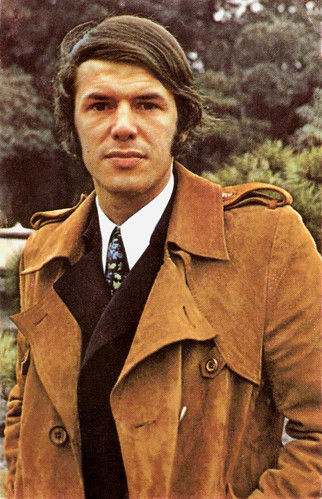
French postcard by Ed. Lyna, Paris, offered by Corvisart, no. AX 2015. Photo: Pathé Marconi.
The Coalmines of Marcinelle
Salvatore Adamo, simply known as Adamo, was born in the small commune of Comiso in Sicily, Italy, in 1943. When he was 3 his family emigrated to Belgium, where his father Antonio worked in the coalmines of Marcinelle.
In 1950, Salvatore was bedridden for a year with meningitis. Salvatore's parents did not want their son to become a miner and made great sacrifices to give him a good education, in a strict Catholic school run by the Frères des Ecoles Chrétiennes. Salvatore was a hard working, solitary student.
He started singing and composing his own songs from an early age. His debut was in a Radio Luxembourg competition in 1960. He participated as the singer and composer of the song Si j'osais/If I May and won the competition's final in Paris.
Shortly afterwards Adamo brought out his first single, without much success. Discouraged, he might have gone back to his studies if it hadn't been for the stubborn persistence of Antonio, who had his own ideas about his son's future. Together, they left for Paris, where they began doing the rounds of the music venues and record labels.
After four singles that went unnoticed Adamo had his first hit in 1963 with Sans toi, ma mie/Without You, My Sweet. It was a classical romantic number, completely different from the yéyé trend, the fusion of American rock and roll and French variety, that was all the rage at the time.
From then on, everything began to happen very quickly. On his twentieth birthday, he performed live at the Ancienne Belgique, the famous music hall in Brussels. He followed this up by doing a support act for Cliff Richard and the Shadows at another famous music venue, L'Olympia in Paris.
A series of hits followed, including Tombe la neige/Snow Falls, Vous permettez Monsieur/Allow Me, Sir and Les filles du bord de mer/The Girls at the Seashore.
Adamo has always remained faithful to the same style: this makes him known as the 'chanteur romantique par excellence'. With a characteristic, slightly broken voice Adamo sang his ballads mainly in French but also in other languages and he had commercial success in continental Europe, Japan and Latin America.
In 1964 he was the second biggest selling artist in the world, behind the Beatles. Reportedly he has now sold over 90 million albums worldwide.
His popularity in Japan began spectacularly with the incredible success of Tombe la neige, which remained at the top of the charts for 72 weeks. Nowadays one of the most widely known karaoke classics is the song Youki Wa Furu, the Japanese version of Tombe La Neige (the local Dreaming of a White Christmas).
Dutch postcard by Gebr. Spanjersberg N.V. (SPARO), Rotterdam. Mailed in 1967. Publicity card for His Master's Voice for the single Dolce Paola/A vot'bon coeur.
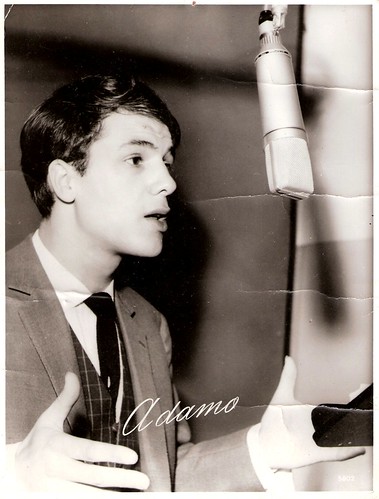
Big Dutch photocard.
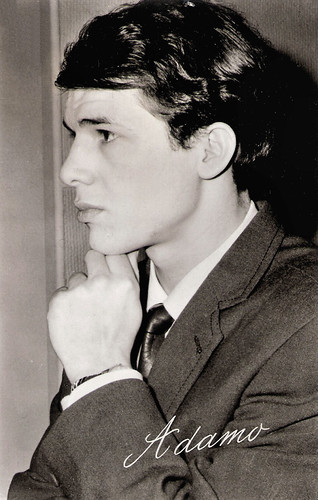
Dutch postcard by Uitgeverij Takken, no. AX 5461.
Dutch postcard by 't Sticht, Utrecht, no. AX 5934, sent by mail in 1965. Photo: 't Sticht. Publicity card for R. Bylois / Benelux Theater, Bruxelles (Brussels).
Dutch postcard by Gebr. Spanjersberg, Rotterdam (ca. 1965). Photo: His Master’s Voice for the single Dolce Paola/A vot’bon coeur.
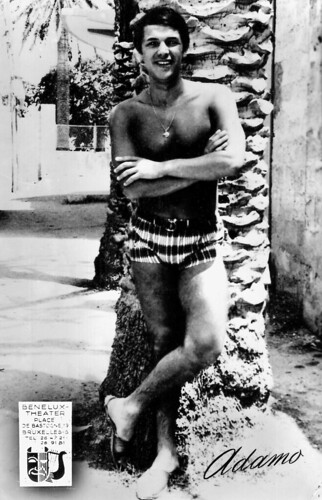
Dutch postcard by 't Sticht, Utrecht, no. 6829. Photo: Eddy Despretz.
Film Acting
Adamo attempted film acting in the crime dramas Les Arnaud/The Arnauds (Léo Joannon, 1967), starring Bourvil, and L’ardoise/The Comeuppance (Claude Bernard-Aubert, 1970).
He even wrote and directed a film himself, L’Île aux coquelicots/The Isle of Coquelicots (1970), but it was a flop.
At the end of the sixties, Adamo married his wife, Nicole. Their son, Anthony, was born in 1969.
In the 1980s Adamo's career faltered. His style of music was no longer fashionable. Since the 1990s however, on the crest of a nostalgia wave, he has successfully resumed composing, issuing records and touring, starting with a full season at the Casino de Paris venue in April 1990.
In 1993 Adamo got an extreme boost in popularity in Belgium thanks to a splendid adaptation singer Arno did of his song Les filles du bord de mer.
Since 1993, Adamo is a honorary Unicef ambassador from Belgium. In 2001 he was named a Chevalier by the Belgian king.
Adamo had a brain haemorrhage in 2004. For a time he had problems with talking, but he has recovered now completely.
His songs were featured on soundtracks of many films, including the camp musical 20 centímetros/20 Centimeters (Ramon Salazar, 2005) and the neo-noir Arrivederci amore, ciao/The Goodbye Kiss (Michele Soavi, 2006) starring Michele Placido.
Adamo himself appeared in another film Laisse tes mains sur mes hanches/Leave Your Hands On My Hips (Chantal Lauby, 2003) and composed the score of Mineurs/Miners (Fulvio Wetzl, 2007), a documentary about the children of Italian coalminers.
Nowadays Adamo lives in Belgium and is still touring. His most recent cd is Le bal des gens bien/The Dance of the Good People, containing duets with the stars of the French chanson. According to RFI Musique, the album received rave reviews from the critics and proved to be a big hit with record-buyers, too.
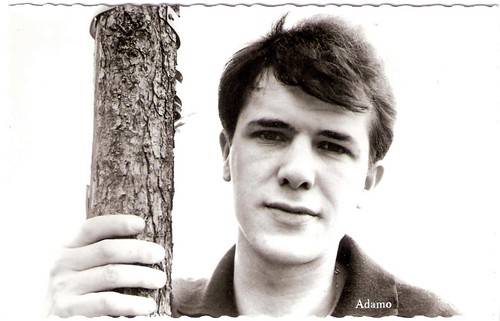
Dutch postcard, no. 1039.
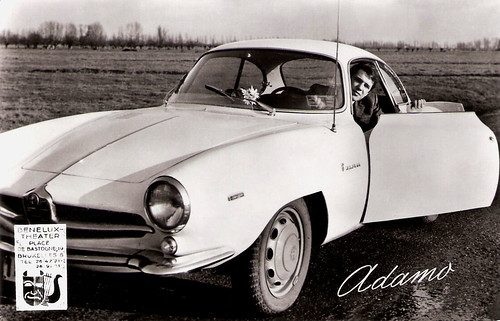
Dutch postcard by 't Sticht, Utrecht, no. 6154. Photo: Benelux Theater, Bruxelles.
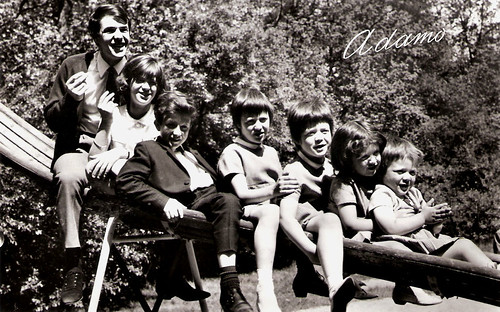
Dutch postcard by 't Sticht, Utrecht / Uitgeverij Takken, no. AX 5826. Photo: NV Bovema.
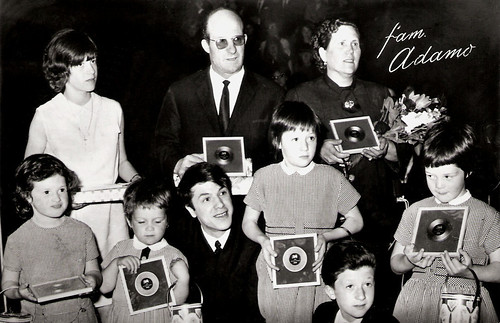
Dutch postcard by 't Sticht, Utrecht / Uitgeverij Takken, no. AX 5820. Photo: NV Bovema.
Adamo sings a multilingual version of Vous permettez Monsieur in this early Dutch videoclip (1964). Source: AdamoLuisPeru (YouTube).
Adamo sings Petit Bonheur in a vintage Scopitone film. Source: plotbox (YouTube).
Sources: Dirk Houbrechts (The Belgian Pop & Rock Archives), RFI Musique (French), Wikipedia, and IMDb.
No comments:
Post a Comment